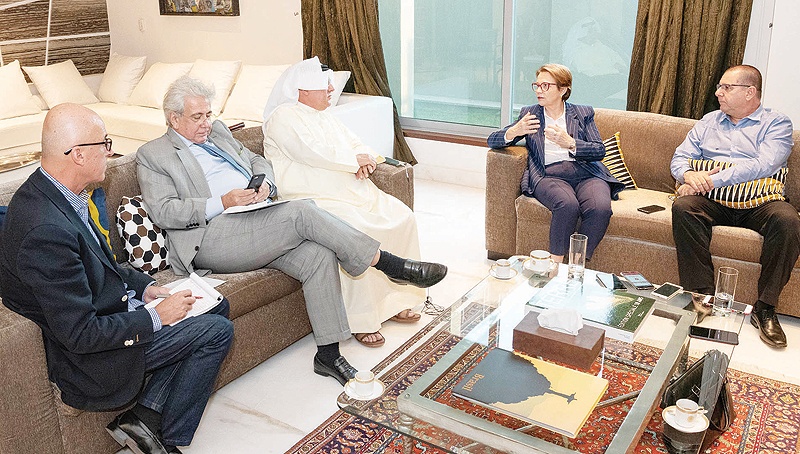Brazilian agriculture minister holds talks with Kuwaiti officials

KUWAIT: Brazil's Minister of Agriculture, Livestock and Food Supply Tereza Cristina is visiting Kuwait as part of her regional tour. "I consider this visit successful. I met with officials of the Kuwait Fund for Arab Economic Development and we discussed financing a project in the North East area of Brazil, which will be realized this year. We hope to receive this loan of $50 million to finance the small farmers in Brazil," she told a press conference on Wednesday.
The trade exchange between Kuwait and Brazil stood at $239 million, 85 percent of it is food products. If the beef ban is lifted, this will increase the trade exchange by $150 million, she informed. This project is conceived to finance the farmers in nine production segments. "The main goal of this project is to eliminate poverty in this area by facilitating loans to farmers at nominal interest rates while the Brazilian government will stand as the guarantor for the loan. The loan will finance the irrigation and electricity projects," added Cristina.
The minister met with officials from the Public Authority for Agriculture Affairs and Fish Resources and officials from the Public Authority for Food and Nutrition. "During these meetings, we discussed the issue of resuming beef imports from Brazil after it was banned recently. We have reached an agreement regarding the certificate, but the Kuwaiti side is still studying the possibility. We have reached 98 percent of the agreement and only some minor issues are remaining to be solved," she explained.
Kuwait agreed to import the Brazilian honey. "Since 2016, Brazil is discussing this issue with the Kuwaiti government. We also spoke discussed the issue of fish, but this is a bit complicated issue due to the Brazilian laws and regulations. We hope that within the next three months, we will be able to solve this issue and start imports," she pointed out.
During the visit of the former Brazilian minister to Kuwait, the fish farming issue was discussed. "Brazilian Agency for Animal and Agriculture Researches provided the Brazilian technical experience in fish farming. I came to Kuwait to meet with the officials personally, as the bilateral relations between Kuwait and Brazil have a long history. So, my visit is to improve and expand the economic and trade relations. I have also invited officials from both Kuwaiti institutions to visit Brazil to familiarize themselves with the technology and researches we do," said Cristina.
The ministry is not interfering in the issuance of religious certificates. "We have good relations with the institutions that issue the Halal certificates. But we interfere in their work only if the importing country asked for that. Our relation is with the importing countries rather than the companies. Brazil is considered one of the countries that strictly applies the halal slaughtering rules and the Brazilian slaughterhouses set part of their work just for the Islamic way of slaughtering. The officials in the Islamic countries that I visited praised the work of the Brazilian slaughterhouses and the institutions that issued the Halal certificate," she further said.
Cristina also spoke about her visit to Egypt and Saudi Arabia. "We struck a deal with Egypt to import 100,000 goats and some dairy products, in addition to green fodder and ideal farms for cows. In Saudi Arabia, we reached a deal for importing eggs, fruits, and nuts. We have also succeeded to lift the ban on four Brazilian products . Two Brazilian companies will also launch two factories in the kingdom," she noted.
Answering a question on the Amazon fires, she explained that it's a major loss for Brazil more than any other country in the world. "The space of the Amazon is very huge and is impossible to guard the whole forests. And 82 percent of it is still preserving the vegetation. The environmental laws in Brazil are very strict against those who sets fire or cuts the trees as the country is keen on protecting the Amazon," concluded Cristina.
By Nawara Fattahova










